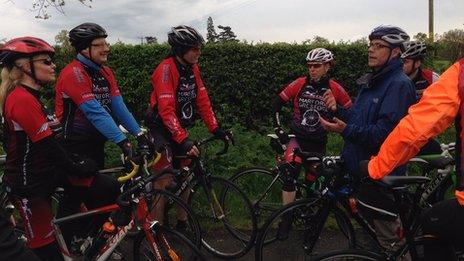How widely is the recovery being felt?
- Published
Nick Robinson met the people of Wrexham to find out how they feel about the economic recovery
Are you feeling the recovery?
The economy's on the mend. The statistics couldn't be clearer but who's feeling it?
That's the question I asked for the first of a series of pre-election features for tonight's TV news examining the issues which will shape the vote on 22nd May.
I spoke to people in the North Wales town of Wrexham - a place where the talk was, until recently, about job losses and closures but which is now switching to new factories being created.
What was striking was the gap between the bosses - who can increasingly feel the recovery in orders, sales and revenues - and many on the shop floor who feel unaffected by it.
This matches the findings of opinion polls.
ICM Research asked people whether economic recovery was benefitting them or their household. Around a quarter agree (26%) - the same number as in December 2013 when the same question was asked.*
So, it looks as if nothing is really moving in the direction George Osborne would like.

However, equally interesting is a significant drop - from 70% to 55% disagreeing - with many people switching to "don't knows".
This fits with my anecdotal experience that many on middle incomes could see things improving but have yet to feel it in their pockets or purses.
NB. The new poll was carried out on the internet whilst the older one was done by phone so the methodology was different
PS. If you watched the piece and thought I looked silly serving chips and interviewing whilst riding a bike - I know, I know!
Update: Although the latest ICM data shows no increase in the numbers saying they feel the recovery various surveys show an increase in confidence about the future.
The monthly European Commission survey shows that:
Consumer confidence among the top 25% of income earners rose to the highest since 1987
The confidence index among those on above average incomes (the so-called second income quartile) is now at the highest since 1988
The confidence index among people in the third income quartile is the highest since 2005
Consumer confidence among all people who work full-time is at a record high (data go back to 1990)
Consumer confidence is above average among all age groups, but is particularly high among the 16-29 year age group (record high since data began in 1990) and 30-49 year age group (second highest on record).
- Published30 April 2014
- Published29 April 2014